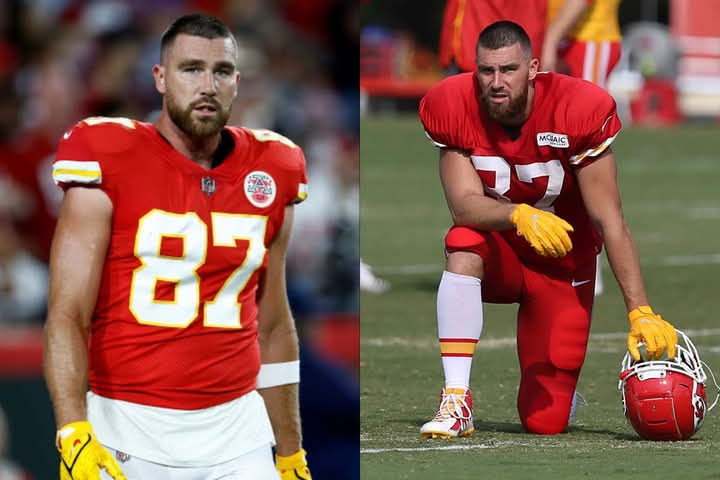CELEBRITIES
Travis Kelce Is Facing Multi-Million Dollar Fines For Anthem Kneeling, Gets Suspended For Next Season

The vigor and vitality of an NFL game, filled with cheers, roars, and raw emotion, occasionally find a counterpart in moments of poignant silence. Such a moment manifested when Travis Kelce, a figure synonymous with elite NFL talent, opted for a quiet yet potent act of defiance.
lynchpin of the Kansas City Chiefs, Travis Kelce, has earned accolades and admiration for his prowess on the football field. But on this particular game day, Kelce captured headlines not just for his plays, but for his decision to kneel during the U.S. national anthem. This gesture, while simple, carried a loaded message about racial inequalities in America. A message that came with a substantial price tag.
The backdrop to Kelce’s decision was not just any regular game day; it was his birthday. A day that traditionally would be replete with well-wishes, celebrations, and perhaps some game day heroics. Yet, as the anthem’s melodies echoed through the stadium, Kelce’s singular act of kneeling overshadowed all other narratives.
His action was reminiscent of the stance taken by former San Francisco 49ers quarterback, Colin Kaepernick, in 2016 — a protest against racial injustices and police brutality in the United States. And just as Kaepernick’s kneeling divided opinions, so too did Kelce’s.
The immediate aftermath in the stadium was a cacophony of contrasting emotions. While some fans acknowledged and applauded Kelce’s act of solidarity with the ongoing fight against racial injustice, others voiced their displeasure, seeing it as a mark of disrespect to the flag and the nation.
Post the game, Kelce, surrounded by a sea of journalists, articulated his reasons for kneeling. “This isn’t about being ungrateful or unpatriotic,” he began. “It’s a call, a reminder that even as we cheer and celebrate within these stadium walls, outside, many face a reality marred by racial prejudice
However, the NFL’s administrative machinery had its focus elsewhere. With a rulebook that has become increasingly strict regarding players’ conduct during the national anthem, Kelce’s act was met with swift retribution. The league slapped him with a staggering $10 million fine, a number previously unseen for such infractions.
The announcement of the fine didn’t just remain a sports-page headline. It surged into national news, prompting debates about freedom of expression, the place of politics in sports, and the very essence of patriotism.
While a faction hailed the NFL’s decision, citing the importance of adhering to established guidelines and expressing respect for national symbols, others viewed the fine as excessive and repressive, arguing that it curtailed an individual’s right to peaceful protest.
Kelce’s teammates, too, weren’t mere spectators. A wave of solidarity swept through the Chiefs’ locker room. While coach Andy Reid emphasized the need to separate personal beliefs from professional conduct, he also acknowledged the broader socio-political landscape, hinting at the necessity for dialogue and understanding.
As days turned to weeks, Kelce’s $10 million fine continued to reverberate through various circles. Beyond the financial implications for the tight end, it raised imperative questions about the intersection of sports, social justice, and the scope of individual expression.
It’s evident that the ripples from Travis Kelce’s birthday protest will not subside anytime soon. Whether it leads to tangible change, revised league policies, or merely remains a topic of heated debate remains to be seen. What’s undeniable, however, is the indelible mark it has left on the discourse surrounding sports and society











